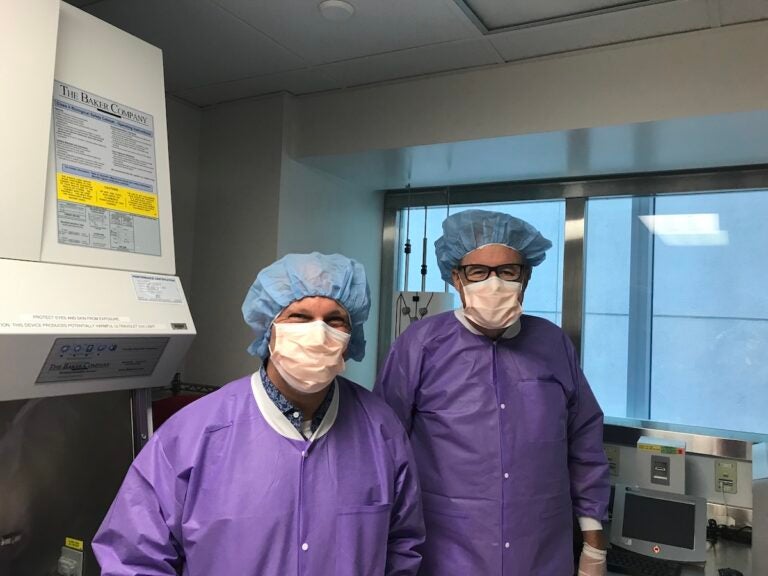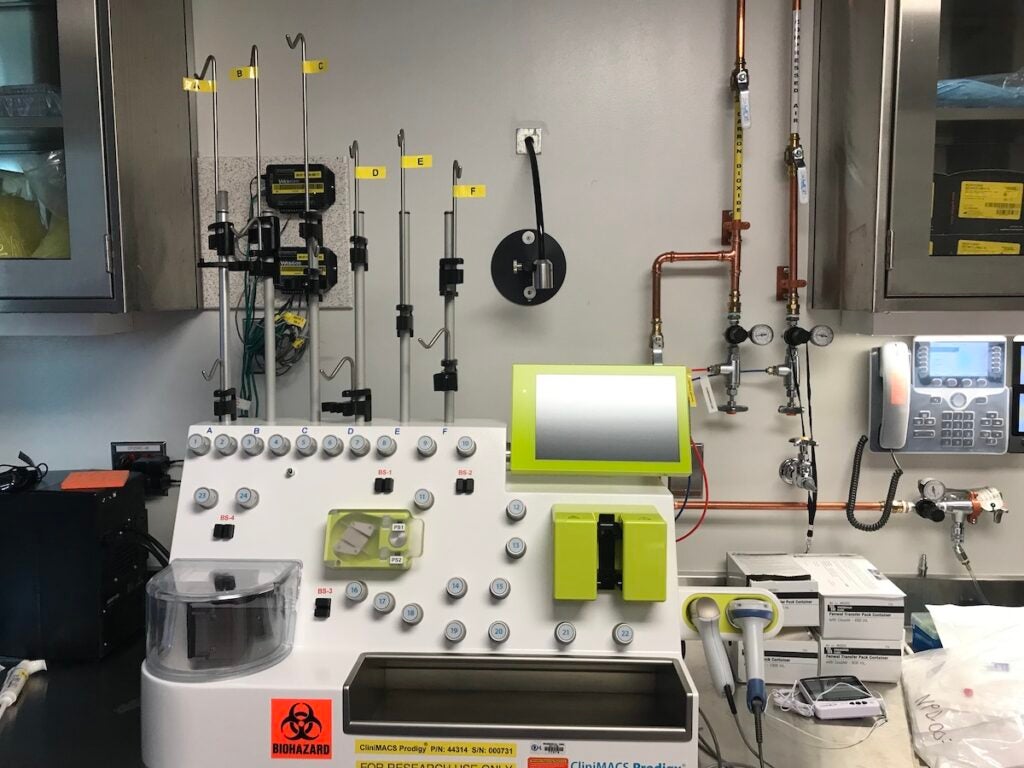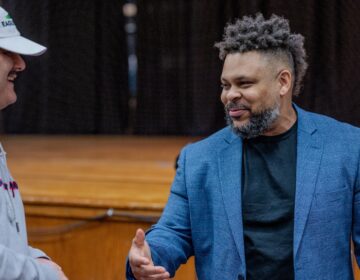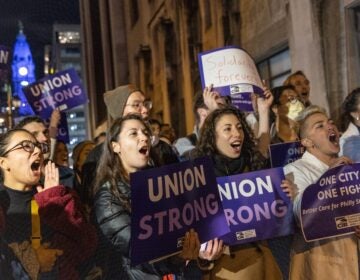CHOP’s on-site production could lower high cost of gene therapies
The Children's Hospital of Philadelphia now houses a machine that is helping to make CAR T-cell therapy much less expensive.
Listen 9:25
-Stephan Kadauke (left) and Steve Grupp of the Children’s Hospital of Philadelphia in the clean room facility where immune therapy treatments are produced. (Maiken Scott/WHYY)
This story is from The Pulse, a weekly health and science podcast.
Find it on Apple Podcasts, Spotify, or wherever you get your podcasts.
More than 10 years ago, pediatric oncologist Stephan Grupp made headlines around the world when he saved a young patient on the brink of death with a brand-new experimental gene therapy treatment. Now, he has his eyes on making these therapies more widely available and less cost-prohibitive.
In 2012, Emily Whitehead became the first child to receive CAR T-cell therapy treatment at the Children’s Hospital of Philadelphia, after her leukemia had relapsed twice. Emily was seven at the time, and her parents had been told that she should be transferred to hospice care. Then they found out that she could get access to an experimental treatment with modified T cells, an approach that had been developed under the leadership of Carl June at the University of Pennsylvania.
“We genetically engineer those T-cells and that imbues them with a cancer fighting property,” said Grupp.
T-cells are a part of the immune system that normally helps the body fight infection and illness, and also cancer. But cancer often manages to evade the immune system. For the treatment, T-cells are collected from a patient, engineered to target a specific type of cancer, such as B-cell leukemia, and then given back to the patient.
“What happens with CAR-T is that these cells go into the patient and then they see all this cancer and they say, ‘oh, we really have to staff up here,’” Grupp said.
These therapies are a living drug, and each CAR-T cell can kill many cancer cells, which is why often a single treatment is sufficient to bring a patient into long-time remission.
Right after receiving the treatment, Emily took a turn for the worse — but then she got better, and better. More than 10 years after her dramatic recovery, Emily is still in remission and she’s doing well. The treatment she received was FDA approved in 2017 under the name Kymriah.
Lowering Gene Therapies’ Steep Costs
Since then, five more CAR T-cell therapies have gained FDA approval, and more than 25,000 people have been treated with this type of immunotherapy. But the manufacturing process is very involved, and the price tag for these bespoke drugs is steep.
“We’re taking cells from each individual patient and manufacturing these cells in a two-week process,” explained Grupp. “At the end, we have cells that we have done a million tests on, to be able to give them back safely to the patient. And the bespoke nature means that we’re doing the kind of testing for every single batch, every single cell product for a patient. Those tests are fairly complicated and add to the expense and the length of time.”
Subscribe to The Pulse
Individual doses can cost several hundred thousand dollars — which makes it hard to imagine a future when these drugs are used more widely and in different situations. The T-cell approach does not yet work for cancers with solid tumors, like breast or lung cancers, but researchers are working on that — and Grupp is thinking about the implications.
“If we want to scale to more common tumors, if we want to scale to countries that can’t pay the kind of prices that you see in the first world then addressing the manufacturing process is the number one challenge,” he said.
The Children’s Hospital of Philadelphia is moving in that direction. An on-site clean room facility at CHOP now houses a machine that could be a game changer. Stephan Kadauke, Associate Director of the Cell and Gene Therapy Lab, says the CliniMACS Prodigy machine can combine all the raw materials that go into the production of a CAR-T cell and all of it is automatically done by a computer with minimal hands-on time.
“Seven to 10 days later you have your CAR-T cell product that’s ready to infuse,” said Kadauke.

For what this machine accomplishes, it looks surprisingly simple, maybe a bit reminiscent of a fancy coffee maker. Kadauke says that’s true.
“The engineering controls are very much comparable to the engineering controls of an espresso machine,” he said. “You have these peristaltic pumps, you have something that makes things colder or warmer, and you have a way to push fluid along some plastic tubing. So, in a way this is a very simple mechanical process.”
The machine is made by Miltenyi Biotec, of Bergisch-Gladbach, Germany, and now other companies are starting to produce similar machines. Kadauke and Grupp say they first had to get this on-site manufacturing process all figured out and approved by the FDA, which involved a lot of paperwork —but now it’s helping to make the drug much less expensive.
“Within our specific setting, where you already have a stem cell lab, where you already have a laboratory medicine department, we can manufacture the product at a very significantly cheaper cost than the commercial product,” said Kadauke.
He says they have done cost analyses that include the cost of labor and testing.
“This doesn’t include facilities and anything else,” he explained. “But we can do this for about $30,000 per patient.” Drug maker Novartis quoted the price for Kymriah at $475,000 in 2017.
And now, Kadauke is making international connections to get this process to more hospitals, for example, he’s collaborating with the National Cancer Institute of Brazil to bring less expensive CAR-T cell therapies to treat children with leukemia in Rio de Janeiro.
“Price is one of the issues, but the other thing is that we spent a significant amount of time figuring out how to make this work for us, how to convince the FDA that this is safe,” he said. “We wrote comprehensive standard operating procedures that have a lot of our know-how and experience baked into them and we feel that it’s a really good thing to not keep that under lock and key for ourselves, but to use this knowledge to improve patient access in other places.”
For Grupp, addressing this question of scale and cost is truly the next frontier — the next challenge with these therapies.
“That’s always been the hope, right, that you would start out with something complicated that works and you go, ‘Oh, that’s so exciting that it works,’” Grupp said. “And now, let’s find a way to make it more automated and make it more available.”
WHYY is your source for fact-based, in-depth journalism and information. As a nonprofit organization, we rely on financial support from readers like you. Please give today.







